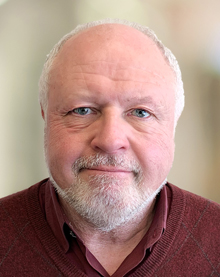Printed in the Winter 2022 issue of Quest magazine.
Citation: Smoley, Richard, "From the Editor’s Desk" Quest 110:1, pg 2
 We all have our critics, I suppose, and the Theosophical Society in America is no exception.
We all have our critics, I suppose, and the Theosophical Society in America is no exception.
What do these critics accuse us of doing?
Nothing.
I mean it: they accuse the TSA of doing nothing. By these accounts, the Olcott staff are sitting proud at our national headquarters, living like rentiers from the proceeds of our investment trust and the largesse of The Kern Foundation, oblivious to the rest of the world.
Indeed we rely on these sources of support and remain grateful to those who have provided them. But these sources are limited and do not permit us to do all the work we do and wish to do.
One important, but often overlooked, aspect of our work is featured in this issue: our Prison Program. National secretary David Bruce outlines some of its history and accomplishments in his article in this issue. In their articles, longtime program members Chadwick Wallace and Aaron Krocker talk about their experience from a first-person perspective.
I don’t participate directly in the Prison Program, but even so, I get any number of letters from prisoners on a variety of topics, indicating that their interest is not only real but often quite advanced.
I occasionally see glimpses of the strange distortions of prison life. A few years ago, by an odd sequence of events, I got a now deceased prisoner thrown into the cooler. I had exchanged a letter or two with him, and he even sent me a copy of a book on the Advaita Vedanta, which I still have.
This prisoner mentioned that he wanted a copy of Schopenhauer’s classic The World as Will and Representation. I looked it up on Amazon, and there was a copy that cost only $15. It was around Christmas, so I thought, “What the hell,” and ordered one to be sent to him.
According to Amazon on the day I ordered it, this book was available. A few days later, Amazon decided it wasn’t and, instead of the book, sent the prisoner an Amazon gift card for the equivalent amount.
Unfortunately, prisoners aren’t supposed to have money on hand, and an Amazon gift card was close enough to get him into trouble with the authorities.
Eventually I had to write to the warden to explain all of this and to intervene for mercy.
This episode taught me that people on the outside can watch all the Shawshank Redemptions and Green Miles they like, but they’re still not going to understand the pervasive strangeness of American prisons.
I have no interest in ranting against the gross dysfunctions of America’s penal system: plenty of other people are doing that. My purpose is simply to point out that the Theosophical Society does a lot of good work that largely goes unnoticed.
It has done so with remarkable frugality. Over the last decade, the TS has offset income losses through any number of means, one of which is staff cutbacks. Last year, a couple of management consultants came in to take a look at our operation. One of them said that our workforce is not only lean but “emaciated.”
As you may have noticed from the house ads in recent issues, the TS has taken steps to remedy these deficiencies. One of the most important has been the addition of a full-time fundraiser in the person of Dave Forsell. I was greatly heartened when Dave came on staff.
Then there is the Olcott headquarters. One recent visitor described it as her “spiritual home,” even though she had never been there before.
Community is a tough issue in America. We are a nation of loners and drifters. Classic American literature shows us this side of ourselves: crazy Ahab on the Pequod, isolated by his madness; Huck Finn floating down the Mississippi on his raft; Gatsby pining away in his ostentatious mansion.
In 2000, sociologist Robert Putnam published a famous book on the solitude of American life, entitled Bowling Alone: The Collapse and Revival of American Community. It is, no doubt, sad that people bowl alone these days, but a bowling league is a rather frail and adventitious community. In an age where people lose their faith as often as their car keys and move an average 11.7 times over their lives, churches and towns are scarcely more durable.
We seem isolated even in our contributions. One always comes back to the same question: how much good am I doing? It is commonplace to say that if you make a difference to even one life, you have accomplished something great. I have no quarrel with that, but often it does not feel that way. As René Guénon said, we live during the reign of quantity, and even if one contributes something of quality to a small number of people, it may not seem to have much value.
There is not really much of an answer to that complaint, except to return to the principle of nonattachment: one does what good one can without regard to results or consequences, most of which are invisible to us anyway. Is it enough? Possibly, possibly not; but I have the strong impression that paying attention to quantity in this regard is little more than a distraction.
Richard Smoley

